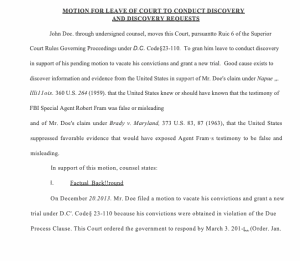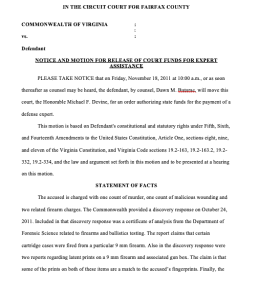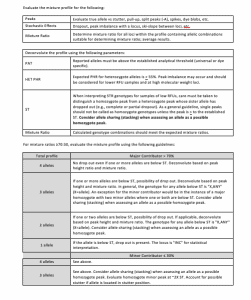

Criminal Defense Expert
- Colorado, United States (US)
- No ratings found yet!
Motion to Exclude Expert Testimony On Firearm Identification, Or Curtail Such Testimony, Under Daubert
Motion to exclude expert witness testimony regarding firearm identification.
Motion To Exclude Fingerprint Identification Evidence, And Request For Daubert Hearing
Motion to exclude fingerprint identification based on lack of scientific evidence. In addition to requesting a Daubert hearing, in which is drawn from questioning the validity of the experts testimony. Daubert hearing occurs without the presence of a jury.
Motion To Limit Or Bar Opinion Testimony By The Govt Firearms Expert, Or For A Daubert Hearing
Motion to exclude expert witness testimony regarding firearm identification.
Motions to Vacate Convictions and Grant New Trial – Forensics
Motion to vacate convictions and grant defendant a new trial due to sentencing obtained in violation of the Due Process Clause resulting in wrongful convictions.

Sample Post Conviction Discovery Motions – Forensics
Document motions to give awareness to all parties evidence discovered post conviction.
Shoeprint Motions OUTLINE – Training
Motion for shoe print examination to determine whether footprints discovered at crime scene match suspect’s shoe prints. Examination looks at manufacturing characteristics as well as wear and tear characteristics unique to each person’s shoe.
Motion In Limine To Limit Conclusions Of Firearm Examiner
Motion to limit the identification and referencing to the firearm in trial.
Motion to Exclude Firearms Evidence for Lack Of Documentation
Document motions to exclude firearms evidence due to the lack of evidential support leading to the claims.
Notice and Motion For Release Of Court Funds For Expert Assistance
Motion to request the State to help supply funds for Defense expert witness.

Affidavit in Support of Motion Designating a Judge to Hear Ex Parte Requests for Funding
Affidavit in Support of Motion Designating a Judge to Hear Ex Parte Requests for Funding
DNA Results Interpretation Guidelines
Rules and regulations regarding DNA results interpretations in Court.
Major Deviation Interpretation Guidelines Attachment

Document includes guidelines on how to interpret biological samples and their deviations.
Motion for Continuance of Trial – Forensics
Motion for continuance, or postponement of an action pending in court to a later date. Purpose of postponement is to formally gathering and documenting evidence.
Motions To Dismiss Pursuant To CrRLJ 8.3(B) And Due To Spoliation Of Evidence
Motions to dismiss of charges pursuant to CrRLJ 8.3(B) and due to spoliation of evidence.
Motion to Declare Defendant Indigent for Purposes Other Than Attorney Fees
Motion to declare the defendant indigent for cost for reasons other than attorneys fees. – Criminal Law Legal Document – Experts and Evidence
Attorney’s fee is a chiefly United States term for compensation for legal services performed by an attorney for a client, in or out of court. It may be an hourly, flat-rate or contingent fee.
If you win the case the owner filed against you, you can then collect the attorneys’ fees you spent from the responsible subcontractor. You can also recover your attorneys’ fees for pursuing a lawsuit you had to file because of someone else’s mistake.
Motion for Disclosure of Any Records or Notes of Psychiatric Treatment of Prosecution Witness in a Sex Law Case
Motion for Disclosure of Any Records or Notes of Psychiatric Treatment of Prosecution Witness in a sex related legal case.
Motion for disclosure is a request asking a judge to issue an order requiring the other party to disclose something. A motion to compel discovery is a motion brought by a party asking the court to compel another party, or third party, to provide certain disclosures or discovery.
Treating psychiatrists are required to release confidential information only when it is court-ordered. An attorney-issued subpoena is not a court order. When a patient authorizes consent, HIPAA grants permission for, but does not require, disclosure.
Appellant’s Opening Brief
Appellant’s opening brief concerning the case where the appellant is charged with driving under the influence of alcohol, careless driving, resisting arrest and obstruction of police.
A Colorado Supreme Court order dealing with the exclusionary rule and driver license DMV
The Department of Revenue, through the Division of Motor Vehicles, revoked a driver’s license, following a hearing officer’s determination that the driver had driven a motor vehicle with a blood alcohol content in excess of the statutory maximum. The district court reversed, holding that the initial stop of the driver’s vehicle was not supported by reasonable suspicion. The court of appeals reversed the district court and held that the legality of the initial contact between the police and the driver was not relevant in the civil administrative proceeding to revoke the driver’s license. The court also held that the exclusionary rule did not apply to suppress evidence of the driver’s BAC. The supreme court holds that, under section 42-2-126, C.R.S. (2011), “probable cause” in the context of the driver’s license revocation statute, as it existed at the time of the hearing in this case, refers to the quantum and quality of evidence necessary for a law enforcement officer to issue a notice of driver’s license revocation, not whether the officer’s initial contact with the driver was lawful. The supreme court further holds that the exclusionary rule did not apply to suppress evidence of the driver’s BAC in the driver’s license revocation proceeding. Accordingly, the supreme court affirms the judgment of the court of appeals.
UNOPPOSED MOTION TO CONVERT DEFERRED JUDGMENT AND SENTENCE TO UNSUPERVISED DEFERRED JUDGMENT AND SENTENCE
UNOPPOSED MOTION TO CONVERT DEFERRED JUDGMENT AND SENTENCE TO UNSUPERVISED DEFERRED JUDGMENT AND SENTENCE
Petition To Re-Open of Estate Case
Petition to Re-Open Estate R1 14 (FINAL).doc







